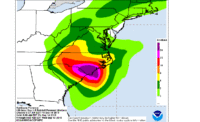A federal executive committee has reported to the Federal Communications Commission that a proposed national, hybrid satellite and terrestrial broadband network to leverage repurposed satellite spectrum cannot work without significant disruption to existing global positioning system devices.
In a Jan. 13 letter, the National Space-Based Positioning, Navigation and Timing Executive Committee, which was asked to evaluate proposals for the network offered by LightSquared LTE, said, "Based upon this testing and analysis, there appear to be no practical solutions or mitigations that would permit the LightSquared broadband service, as proposed, to operate in the next few months or years without significantly interfering with GPS."
The committee, which represents nine federal departments and agencies, further stated that as a result of its findings, "no additional testing is warranted at this time."
The committee had been asked by the Federal Communications Commission and the National Telecommunications and Information Administration to test and analyze LightSquared's original plan, as well as plan modifications designed to reduce interference with GPS. The company owns mobile satellite services frequency bands that it wants to use as the backbone of a national network built out with thousands of relay towers.
LightSquared's frequencies are adjacent to the ones supporting the GPS system, however, and GPS industry interests have warned that transmissions from those towers would significantly interfere with GPS devices in the vicinity, especially the highly accurate and sensitive ones used in construction and agriculture. Many other industry sectors dependent on GPS have raised questions and objections, too.
The FCC made the successful resolution of those interference issues a condition for granting LightSquared permission to proceed.
The committee's letter stated that the conclusion was unanimous, that both LightSquared's original and subsequently modified plans for its proposed mobile network "would cause harmful interference to many GPS receivers. Additionally, an analysis by the Federal Aviation Administration has concluded that the LightSquared proposals are not compatible with several GPS-dependent aircraft safety-of-flight systems."
The letter, signed by the co-chairs of the committee, Ashton B. Carter and John D. Porcari, the deputy secretaries of defense and transportation, respectively, goes on to propose that new GPS spectrum interference standards be drafted to ensure that future proposals for non-space, commercial uses in the bands adjacent to GPS signals are implemented "without affecting existing and evolving uses of space-based positioning, navigation and timing services vital to economic, public safety, scientific, and national security needs."
LightSquared reacted to the letter by releasing a statement decrying "a systematic disregard for fairness and transparency" on the part of the committee. It also filed a complaint with the National Aeronautics and Space Administration's Inspector General’s office alleging conflicts of interest on the executive committee's advisory board. It noted that Brad Parkinson, the board's vice chair, is also a director of Trimble Navigation, a GPS industry leader. It claims Parkinson has "a professional duty to his company to protect its market position and its increased shareholder value that directly contradicts his responsibility to provide impartial advice to the government."
Revised Jan. 19 to correct name of agency and its investigative office



Post a comment to this article
Report Abusive Comment